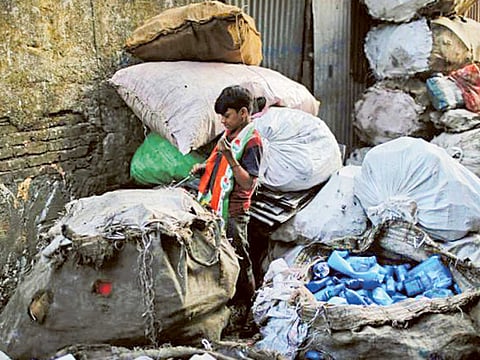Plastic recycling presents an economic opportunity too for Gulf states
Diverting single-use plastic for recycling winds up as economic prospects too

Every year, the International Plastic Free Day serves as a powerful reminder of the urgent need to address the plastic waste crisis. However, not all types of plastic are created equal.
Some are necessary for the economy, while others are not. For instance, plastic packaging is essential for protecting goods during transportation and storage, reducing food waste and increasing shelf life. Plastic bottles and containers are also crucial for the beverage industry, as they provide a convenient and safe way to transport liquids.
Single-use plastics like straws, utensils, and bags have become a significant environmental problem due to their short lifespan and improper disposal. These end up in landfills or oceans, where they can take hundreds of years to decompose. The International Plastic Free Day plays a significant role in driving this awareness and encouraging businesses and consumers to adopt more sustainable practices.
In the Middle East, the plastic recycling sector has seen impressive growth, with several countries implementing ambitious targets and investing in innovative recycling technologies. According to a report by the Gulf Petrochemicals and Chemicals Association (GPCA), the Middle East’s plastic recycling capacity has grown by 144 per cent since 2016.
This is largely due to heightened awareness of the plastic waste crisis and resulting demand for recycled plastics.
UAE takes on plastic recycling challenge
One notable success story from the region is the UAE, which has emerged as a leader in plastic waste management. The UAE has set ambitious recycling targets, with plans to divert 75 per cent of waste from landfills, with an eventual diversion target of 98 per cent by 2030.
To achieve this, the country has invested in recycling facilities and implemented various initiatives to promote plastic waste reduction. The UAE has also taken a significant step towards environmental sustainability by implementing a ban on single-use plastics. This policy aims to reduce plastic waste and protect natural resources.
As a result, the UAE has seen a significant increase in the demand for recycled plastics, with the Emirates Environmental Group (EEG) reporting a 30 per cent recycling rate for plastic waste in 2020.
Being rid of single-use plastic
One of the most significant problems is the widespread use of single-use plastic bags. These are not only harmful to the environment but also contribute to the growing issue of plastic pollution in our oceans and landfills.
The success of the recycled plastic industry in the Middle East demonstrates the power of collective action in addressing the plastic waste crisis. While the world’s plastics market is forecast to reach $75 billion by 2028, increased awareness of plastic waste and the resulting demand for recycled plastics continue to lead significant growth, with numerous success stories and case studies highlighting the positive change that can be achieved through collaboration and innovation.
Indeed, the fight against plastic pollution requires a collaborative approach that involves recycled plastic companies, businesses, and consumers. Collaboration is at the heart of Rebound Plastic Exchange’s mission to provide a transparent and efficient way for buyers to source recycled plastic materials, which helps to reduce their carbon footprint and support sustainable practices.
Billions lost from not recycling
Over 380 million tons of plastic is produced every year. Half of all plastic is single-use. Only 14 per cent of plastic packaging is collected for recycling while 95 per cent of the value of plastic packaging material, worth $80 billion to $120 billion annually, is lost to the economy.
As we continue to work towards a more sustainable future, it is crucial to recognize the vital role played by collaboration within the recycled plastic industry and support its development.
By incentivizing the use of recycled plastic and partnering with businesses, government entities, and consumers, RPX is contributing to a more circular economy and a cleaner environment for future generations.
The impact of International Plastic Free Day on the recycled plastic industry highlights the potential for grassroots movements to drive systemic change, inspiring hope that together, we can overcome the plastic waste crisis and preserve our planet for future generations.
Let us remember that every small action counts and that, together, we can make a lasting difference.
Sign up for the Daily Briefing
Get the latest news and updates straight to your inbox




